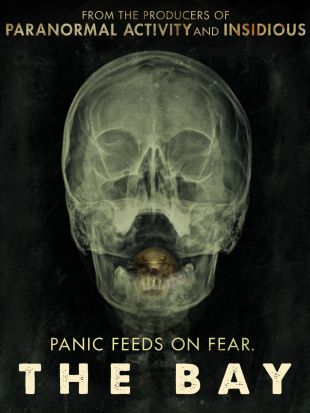
Paranormal Activity creator Oren Peli helps that old dog Barry Levinson learn some new tricks in The Bay, and the Oscar-winning director performs them rather well as he uses found footage to tell the story of a quaint Maryland community that's attacked by an aggressive parasite that makes the leap from fish to humans with terrifying ferocity.
Three years after a massive government cover-up involving a parasitic outbreak in a small seaside town, a reporter unearths chilling footage that reveals the terrifying truth. On July 4, 2009, the town of Claridge, MD, experienced an unprecedented biological disaster. An isopod parasite typically found in fish somehow made its way into a human host. As the town gathered for its annual Independence Day celebration, the parasite began to spread at an unprecedented speed, consuming its victims from the inside out. We witness the terrifying events that unfolded during that fateful holiday weekend as captured on the security cameras, mobile phones, and webcams of the people who experienced them firsthand, but never lived to tell their stories.
/_derived_jpg_q90_584x800_m0/23453203_PA_The-Bay_1.jpg)
As the found-footage phenomenon takes root as a genuine mainstream film movement, it's only natural that established directors try their hand at the rapidly evolving style. George A. Romero did it with varying degrees of success in 2007's Diary of the Dead, and now with the very first horror film of his four-decade career, Levinson does the creator of the modern zombie movie one better by tapping directly into our deepest fears about rampant disease and man-made epidemics. A sort of found-footage-style Outbreak for the first third of its running time, The Bay frames the story of the emerging plague with the footage and recollections of a budding journalist (Kristen Connolly) who is covering Claridge's annual Fourth of July celebrations when what initially appears to be a rash of murders breaks out in the town. Meanwhile, the video diaries of two ocean biologists reveal an alarming infestation spreading in the local waters; an overburdened doctor Skype chats with the CDC as his waiting room overflows with patients showing signs of what initially appears to be a highly contagious bacterial infection; local cops struggle to maintain order; the town mayor races to silence any sounds of alarm; and an unsuspecting young couple head to Claridge in a rented boat with their infant son in tow. Together with screenwriter Michael Wallach, Levinson juggles these plotlines with the skill of a seasoned storyteller, giving us just enough information at each turn to answer important questions while keeping tension levels high. That said, some of the best scares come during scenes that don't necessarily involve the main storylines, but serve as little self-contained segments of shock peppered throughout the film.
The use of multiple video formats proves highly effective at keeping the viewer off balance; it's difficult to get comfortable when you never know what type and quality of images you'll be confronted with next. Also, by filling out the cast with talented yet lesser-known actors who prove largely adept at appearing unrehearsed in front of the camera, Levinson does a good job of maintaining the illusion of a small town plunged into total chaos. And though the spoken-but-not-seen coda ends The Bay on a somewhat anticlimactic note, Levinson and Wallach have done such an effective job at maintaining tension throughout that the film stands as a refreshing approach to such cautionary creature features as Godzilla or, more recently, The Host, and will no doubt still be lingering in our heads during our next trip to the lake. Much like a genuine parasitic infection, the horror takes root inside of us, and continues to grow long after the initial exposure.
